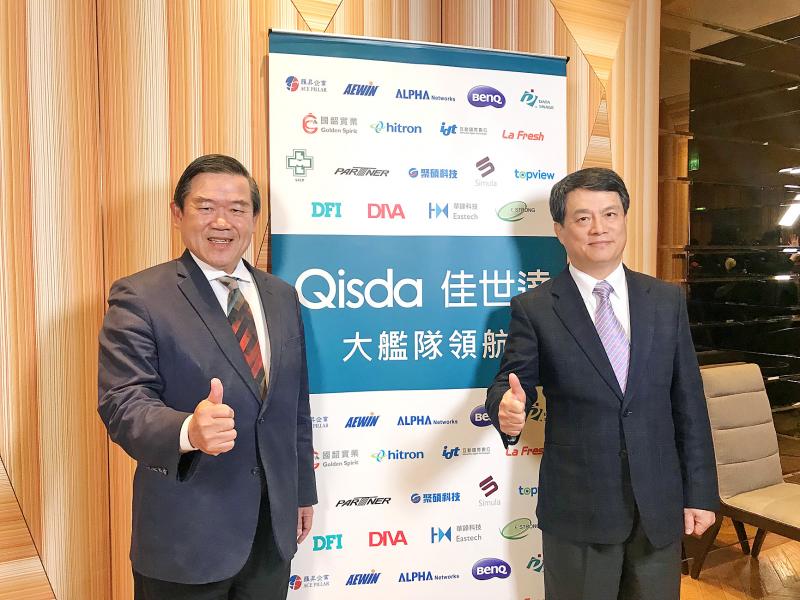Electronics maker Qisda Corp (佳世達) and TCI Co (大江生醫), which manufactures health food, functional beverages and skincare products, on Friday said that they would form a strategic alliance through a private placement.
Under the deal, Qisda plans to acquire 4.72 million shares in a TCI subsidiary, TCI Gene Inc (大江基因), at NT$115.5 per share, the company’s regulatory filing showed on Friday.
TCI Gene is mainly engaged in the research and manufacturing of various genetic testing, stem cell and immune cell products.

Photo: Chen Mei-ying, Taipei Times
The NT$545.16 million (US$18.38 million) investment would allow Qisda to hold a 17.84 percent stake in TCI Gene, using its own capital to fund the deal, the filing said.
“To strengthen the company’s biotechnology business, Qisda has stepped into the field of precision medicine,” the company said in the filing. “Through this investment, we will complement each other’s resources, expand the biotechnology and medical care business, and provide customers with a wider range of products and services.”
Qisda manufactures computer accessories, communication devices and consumer electronics. It also provides consulting and technical services, and has cultivated a high-value-added medical business, which has been the firm’s best performer during the COVID-19 pandemic.
Precision medicine is an emerging model in which precise detection prevents diseases in their early stages, and treats them with specific medicines. The practice provides treatment that most accurately minimizes adverse drug reactions and avoids wasting medical resources, it said.
A PricewaterhouseCoopers report on the precision health industry said that the market is forecast to grow from US$68.3 billion in 2020 to US$134.4 billion in 2025, with a compound annual growth rate of 14 percent.
The genetic testing market, which is the basis of precision medicine, has attracted much attention, Qisda said.
The market potential for this segment is predicted to grow from US$8 billion last year to US$15.8 billion in 2030, with compound growth of 7.6 percent, it said, citing data from Precedence Research.
The application of cell therapy in precision medicine should also have high growth potential, it added.
Precision medicine is an emerging business suitable for technology firms, as it is expected to integrate new technologies such as genetic testing, immune cell therapy and artificial intelligence, Qisda chairman Peter Chen (陳其宏) said.
“We look forward to providing more accurate preventive medicine, precise diagnosis and treatment services to the public through cooperation with TCI Group (大江生醫集團),” Chen said in a statement.
TCI Group chairman Vincent Lin (林詠翔) said he expects to leverage the strength of Qisda in medical services, equipment, pharmaceutical access and big data solutions to increase TCI Gene’s products and testing services.

With this year’s Semicon Taiwan trade show set to kick off on Wednesday, market attention has turned to the mass production of advanced packaging technologies and capacity expansion in Taiwan and the US. With traditional scaling reaching physical limits, heterogeneous integration and packaging technologies have emerged as key solutions. Surging demand for artificial intelligence (AI), high-performance computing (HPC) and high-bandwidth memory (HBM) chips has put technologies such as chip-on-wafer-on-substrate (CoWoS), integrated fan-out (InFO), system on integrated chips (SoIC), 3D IC and fan-out panel-level packaging (FOPLP) at the center of semiconductor innovation, making them a major focus at this year’s trade show, according

DEBUT: The trade show is to feature 17 national pavilions, a new high for the event, including from Canada, Costa Rica, Lithuania, Sweden and Vietnam for the first time The Semicon Taiwan trade show, which opens on Wednesday, is expected to see a new high in the number of exhibitors and visitors from around the world, said its organizer, SEMI, which has described the annual event as the “Olympics of the semiconductor industry.” SEMI, which represents companies in the electronics manufacturing and design supply chain, and touts the annual exhibition as the most influential semiconductor trade show in the world, said more than 1,200 enterprises from 56 countries are to showcase their innovations across more than 4,100 booths, and that the event could attract 100,000 visitors. This year’s event features 17

SEMICONDUCTOR SERVICES: A company executive said that Taiwanese firms must think about how to participate in global supply chains and lift their competitiveness Taiwan Semiconductor Manufacturing Co (TSMC, 台積電) yesterday said it expects to launch its first multifunctional service center in Pingtung County in the middle of 2027, in a bid to foster a resilient high-tech facility construction ecosystem. TSMC broached the idea of creating a center two or three years ago when it started building new manufacturing capacity in the US and Japan, the company said. The center, dubbed an “ecosystem park,” would assist local manufacturing facility construction partners to upgrade their capabilities and secure more deals from other global chipmakers such as Intel Corp, Micron Technology Inc and Infineon Technologies AG, TSMC said. It

EXPORT GROWTH: The AI boom has shortened chip cycles to just one year, putting pressure on chipmakers to accelerate development and expand packaging capacity Developing a localized supply chain for advanced packaging equipment is critical for keeping pace with customers’ increasingly shrinking time-to-market cycles for new artificial intelligence (AI) chips, Taiwan Semiconductor Manufacturing Co (TSMC, 台積電) said yesterday. Spurred on by the AI revolution, customers are accelerating product upgrades to nearly every year, compared with the two to three-year development cadence in the past, TSMC vice president of advanced packaging technology and service Jun He (何軍) said at a 3D IC Global Summit organized by SEMI in Taipei. These shortened cycles put heavy pressure on chipmakers, as the entire process — from chip design to mass